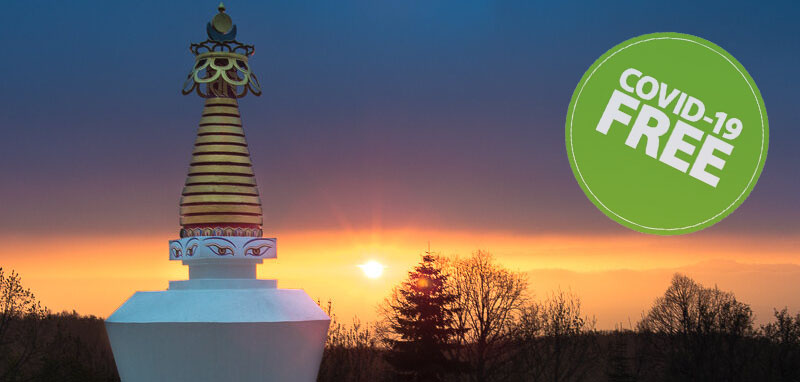
Prendre refuge
« Prendre refuge » signifie plutôt en tibétain « aller vers ce qui protège ». Il y a donc bien ici l’idée d’aller vers un lieu ou une voie, une pratique, une protection qui pourra nous rassurer. Mais pourquoi chercher refuge, si nous n’avons pas particulièrement peur ? Parce qu’en réalité, c’est ce que nous faisons constamment. Et si nous en avons une telle habitude, autant lui donner du sens.
En effet, quand nous cherchons à répondre à nos peurs existentielles, en rassemblant tout ce qui nous sécurise, nous nous réfugions dans l’argent, le pouvoir et les autres en espérant qu’ils pourront répondre à nos besoins, nos inquiétudes et assurer notre bonheur. Cette recherche du bonheur est légitime, mais les méthodes ordinaires que nous employons sont-elles efficaces ?
C’est justement quand ce doute s’élève, et qu’une première prise de conscience nous fait réaliser que quelque chose ne fonctionne pas bien dans ces stratégies ordinaires, que nous pouvons rencontrer le bouddhisme, au hasard d’une lecture ou d’une discussion. En nous demandant ce qu’il peut nous offrir, nous finirons par comprendre l’originalité et la force des réponses qu’il apporte. « Prendre refuge », d’un point de vue bouddhiste, commencera alors à avoir du sens.
Peu à peu, nous comprendrons qu’il n’est pas question extérieurement d’adhérer à une religion exotique, de changer notre alimentation, de ne pas avoir d’émotions ou d’abandonner nos relations. Nous comprendrons que, même si le renoncement dont font preuve les moines et les nonnes est noble et profond, l’enseignement du Bouddha peut s’appliquer à chaque instant de notre vie, et qu’il est possible d’être qui nous sommes tout en étant bouddhiste. Certes, des changements intérieurs profonds se manifesteront, mais nous prendrons conscience de notre richesse innée, grâce à une voie faite pour que chacun·e chemine à sa manière.
Il deviendra alors évident de « prendre refuge », ce qui est bien plus qu’une simple formalité. Bouddha, Dharma et Sangha, les trois Rares et Sublimes, commenceront à n’être plus uniquement des mots, mais des termes indiquant les immenses qualités que nous possédons aussi, et que nous pouvons progressivement cultiver.
Take refuge
In Tibetan, « taking refuge » means « going towards that which protects ». There is therefore the idea here of going towards a place or a path, a practice, a protection that can reassure us. But why seek refuge if we are not particularly afraid? Because in reality, that’s what we do all the time. And if we have such a habit, we might as well make sense of it.
Indeed, when we seek to respond to our existential fears, by gathering everything that makes us feel secure, we take refuge in money, power and other people, hoping that they will be able to respond to our needs, our worries and ensure our happiness. This search for happiness is legitimate, but are the ordinary methods we use effective?
It is precisely when this doubt arises, and a first awareness makes us realise that something is not working well in these ordinary strategies, that we may encounter Buddhism, by chance in a reading or a discussion. By asking ourselves what it can offer us, we will come to understand the originality and strength of the answers it provides. « Taking refuge », from a Buddhist perspective, will then begin to make sense.
Gradually, we will understand that it is not outwardly a matter of joining an exotic religion, changing our diet, having no emotions or abandoning our relationships. We will understand that, although the renunciation shown by monks and nuns is noble and profound, the Buddha’s teaching can be applied to every moment of our lives, and that it is possible to be who we are while being Buddhist. Certainly, profound inner changes will manifest themselves, but we will become aware of our innate richness, thanks to a path made for each one to walk in his or her own way.
It will then become obvious to « take refuge », which is much more than a mere formality. Buddha, Dharma and Sangha, the three Rare and Sublime, will begin to be more than just words, but terms indicating the immense qualities that we too possess, and which we can gradually cultivate.



